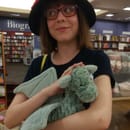I often find myself subjected to a lot of questions when I tell people that I study anthropology. What is it? What is it about? Why would you want to be an anthropologist?
I know for many people this is often a common experience, with people confused as to what our majors are and what kind of things we study. Her Campus at UVic has decided to turn these common questions into a series, with our members answering questions about their majors!
So I decided to compile some of the common questions I, as well as many others in the department, receive when people ask about what I’m studying.
What is your year and major?
I’m in my fifth year of a biological anthropology major! While anthropology is usually considered a “holistic” social science, my program focuses more on the biological aspects of anth. There’s more focus on statistics, genetics, evolution, archeology, and biology. Aside from that difference, though, I still focus primarily on people.
Why did you decide to major in that program?
Well, initially I was a chemistry major. While I was really excited going into the degree, I found that chem was incredibly draining. I wasn’t passionate about what I was studying, I found it difficult to focus and I burnt out fast. I didn’t like the labs or the work or any of the material.
In my second year, I took an introductory class to biological anthropology and absolutely fell in love with everything about it. I cared enough to do the work and put extra effort into it, and I studied a lot more. I was genuinely excited to write the final exam because I was confident and excited about the information. I took a few anth classes in my third year before officially switching over, but I found that the experiences were similar: I was much more willing to work hard when learning that information than I ever was with my chemistry courses.
Best Class in Your Program You’ve Taken?
Hands-down, one of the best classes I’ve taken in my program was the Forensic Anthropology class that the university offers during the summer, Anth 394. It’s a field course that’s offered every other year during the summer. Essentially, you spend the course working on developing skills that are important for forensic anthropology. We started with basic skills like mapping, learning to take crime-scene photos, and searching for and noting evidence.
The bulk of the class, though, was focused on simulating a real missing person’s case. It was so in-depth the professor had even made fake social media profiles for the victim and some of our suspects! We were split into groups that were meant to be our forensics teams, and we were each given a potential crime scene to search through. Each team had to perform a full excavation using all the skills we’d learned earlier in the course. It was definitely a difficult course, and it was physically strenuous, but it was so much fun! I’ve never been more willing to crawl in the dirt and pull up weeds looking for fake clues.
It’s a class I would recommend to anyone interested in forensics, as it really opens your eyes to a lot of different skill sets as well as critical thinking skills focused in a true applied setting.It also helped me reorient myself and consider what I want to do after graduation.
Something you wish you’d known before you started your degree:
I wish I’d known that there would still be a fair amount of math involved, because I wouldn’t have thrown out my old statistics notes. I’m in a class this semester that’s based mostly on statistics and using a data program. I remember doing everything in a class I took years ago, but I chucked all the notes because I didn’t think I would need the information ever again. Oh, if only I could go back in time and save those notes from the trash.
Words of wisdom for people getting started:
Remember that anthropology is primarily about studying people. It’s about humans, about our history, our evolution, but it’s also about people today. The focus of anthropology, whether it’s biological or cultural, is about us. It means that you’ll study humans in many different ways, and you’ll learn multiple research techniques. It also means that sometimes you have to work directly with other people. This isn’t something that you can hide in a lab for.
It’s also something where you have to be incredibly respectful of others. You handle the remains of someone who used to exist. You study and learn about someone’s culture. You deal with people’s lives.
I think, in general, you need to love people if you want to be an anthropology major.
Do you study dinosaurs?
I’ve actually been asked this question a lot, and unfortunately no. As much as I love a good dinosaur fossil, anthropology focuses on humans and human ancestors. We study Neandertal fossils, and we study ancient human remains, but not dinosaurs. That course of study is paleontology.
What about you? Do you find yourself subjected to questions about your majors? Do you have any other questions about anthropology? Let us know!



